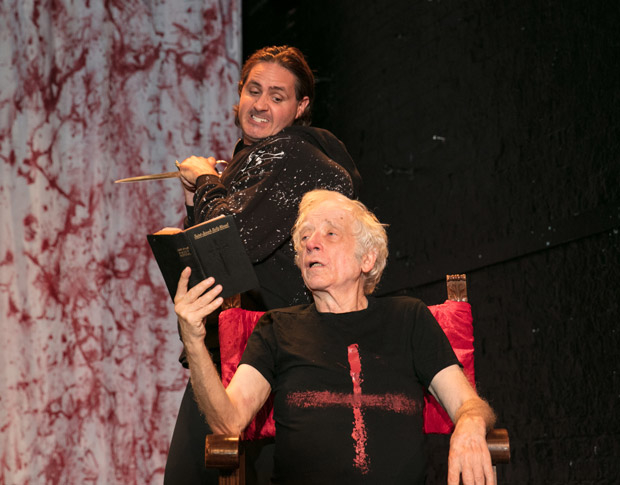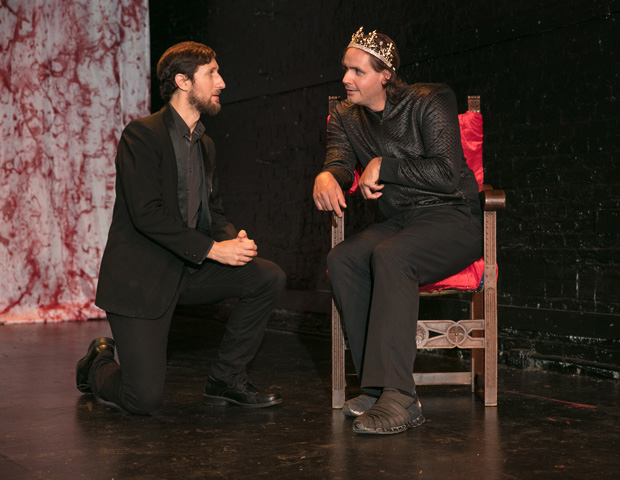Wars of the Roses Forges an Alliance Between Henry VI, Part 3 and Richard III
Two Shakespeare history plays become one in this adaptation by Austin Pendleton.

(© Chris Loupos)
Actor-director Austin Pendleton has titled his integration of Shakespeare's Henry VI, Part 3 and Richard III "Wars of the Roses," but "Daddy Issues" might be more fitting. Rather than chronicle the history of the struggle between the Houses of Lancaster and York for the English throne — which would have required incorporating Henry VI, Parts 1 and 2 — he delves into the psychology of Richard III, whose bloody slog to the crown Pendleton sees as driven by a "sense of worthlessness that overcame him after the death of his loving father," according to his program note. The resulting production, which opens tonight at 124 Bank Street Theater, is compelling but patchy.
Pendleton would be the first to admit the patchiness, acknowledging the necessity of "a great deal of cutting" in that same program note. What mainly survives from Henry VI, Part 3 are scenes that foreground the psychological narrative Pendleton wants to highlight. Thus a single act compresses the humiliation and murder of Richard's father, the vengeful anguish of Richard upon hearing of it, and Richard's speech about himself about "dream[ing] on sovereignty / Like one that stands upon a promontory, / And spies a far-off shore where he would tread." (In the original play, these moments are spread across three acts.)
Most of the Richard III portion of Wars of the Roses proceeds as you'd expect. Richard, hell-bent on gaining that far-off promontory, offs one person after another on his way to it. Among the casualties are his brother George and his nephews, mere children who die "girdling one another / Within their innocent alabaster arms." As Richard's grip on power tightens, his grasp of reality weakens. Near the end of the play, as he tries to get some sleep before fighting a rival claimant to the throne, he sees ghosts of those he's murdered, who wish him despair and death in the coming battle.

(© Chris Loupos)
As the structuring of Wars of the Roses makes clear, Pendleton's main interest in its constituent plays is character, a focus reflected in other aspects of the production, which he and codirector Peter Bloch sparingly stage. There's no set to speak of, just a blood-spattered backdrop and a few pointed props: two crowns, two daggers, a table with interchangeable chairs, and one noninterchangeable chair padded tellingly with velvety red. Though less garishly symbolic, the sleek modernity of Maya Luz's costumes (Henry VI wears a blazer and tennis shoes) clashes with the daggers and crowns, not to mention the Elizabethan English.
The good news about the de-emphasis on production values is that the acting, much of it outstanding, comes to the fore. As Richard III, Matt de Rogatis must carry the show, and he does, neither caricaturing nor hiding his character's formative deformity. He instead uses it to magnify his words and feelings, as when he jerks his crooked arm upward while voicing his intent to pluck the crown. Rivaling him in resourcefulness is Johanna Leister as Queen Elizabeth, who, by merely modulating her voice, can go from charming Richard's brother Edward to bitterly mocking Richard. Debra Lass, as Henry's wife and then widow, also displays ingenuity. Murmuring many of her cruelties rather than screeching them, she turns the "ruthless queen" that Richard's father sees into an object of sympathy.
The overall sympathy-stirring, character-driven approach to the material generally works, but there are bits of plot that get lost in the poor-Richard arc. For instance, the audience repeatedly hears George referred to as "perjured" but never sees his perjury because the scene in which he switches sides from York to Lancaster has been excised. And as for the whole conception of Richard's hunger for power being generated by the loss of his father — maybe, maybe not. Freud himself offered an analysis of the character based on the opening monologue of Richard III (which, as it happens, Pendleton has cut): seeing in Richard the personality type of a group he calls "the exceptions," who believe they're entitled to commit wrongs in life because life has done them wrong — in Richard's case, by warping his body in the womb.
Whether or not you buy Pendleton's interpretation, it's thoughtfully constructed and performed. His staging is a valiant attempt to reinvigorate centuries-old drama and history. In a theatrical climate dominated by profit-minded musicals and movie adaptations, even Richard might be impressed with his boldness.








